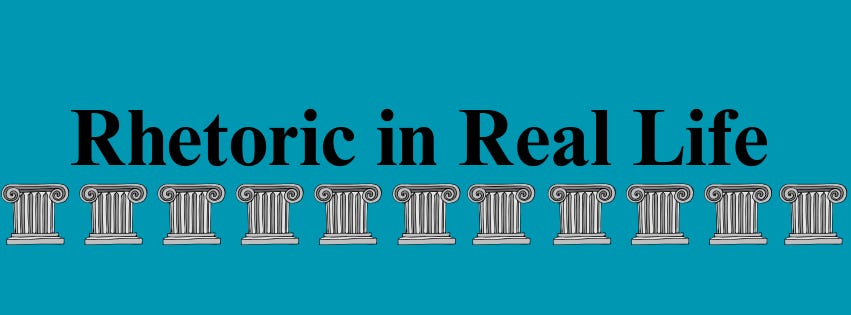Here’s What’s Wrong with Saying “My Kids Come First” on the Dating Apps
It sounds good, but it's a red flag 🚩 🚩 🚩 🚩 🚩
We’re going to talk about WHY it’s a red flag within the context of a quick rhetoric lesson. Ready? 😊
Quick definitions:
“Rhetoric” is the study of language and other sign systems, and “applied rhetoric” is simply applying that study to real life. Burned Haystack Dating Method™ uses applied rhetoric to game the dating apps. Okay, let’s analyze . . .
Some foundational principles of rhetoric are text, subtext, and context.
“Text” is the actual words you see;
“SUBtext” is what lies beneath the text — the intended or hidden meanings OR the *unintentional* reveals (what CDA [critical discourse analysis] does REALLY well is train you to quickly detect what people are telling you without intending to);
“CONtext” is the conditions surrounding the text (the prefix “con” means “with,” so literally “with the text”).
Okay, let’s return to the “My kids come first” line and analyze for text, subtext, and context.
Text: Taken literally, this is a neutral-to-positive statement. This person’s children are their priority.
Subtext: The word “first” implies the words “second, third, fourth, last,” etc. Suddenly the statement is more complex, right? When we add the implication? The subtext now becomes more shaded, more hypothetical, and more NEGATIVE. In advance of meeting you, this person is telling you that you will NOT be first.
It’s a defensive statement, and we should ask why. It’s also an unnecessary statement, and we should interrogate that as well. “Kids come first” is literally the definition of the parental and societal contract. It’s assumed. It’s like saying “I really love my kids. They’re important to me.” Of course you do!
But that’s not how it’s ever phrased in the dating apps. Phrasing it as “My kids come first” is ALSO SAYING: “Don’t expect too much from me.” “Don’t expect me to prioritize you.” “Things in this relationship are going to be on my terms.” “I’m assuming the ‘Director’ role in this relationship before we’ve even met.”
The person who writes this is making assumptions about the person who reads it, and those assumptions range from fear (This person is going to put too much pressure on me and demand too much from me and make me feel smothered!) to unchecked egotism (I’m the more desirable person in this relationship, and this person is clearly going to want to spend more time with me than I do with them).
Note that these meanings are unintentional *even to the person who wrote them.* They’re also understandable. I’ve certainly felt smothered and even threatened in relationships and defensively put up walls for people who weren’t even at the scene of the original crime, but that’s not a great way to forge healthy connections. If this is in YOUR profile, spend some time thinking about why. Consider whether there’s a more accurate way to say it.
Writing something like “Family is really important to me” or “I’m a family-oriented person” communicates the same message *while also* making room for someone else to enter that family circle (at some MUCH LATER and more appropriate point!), which is ostensibly why you’re on a dating app in the first place — to find a partner who will be an integral part of your life. At the point you meet someone you want to build a life with, it’s actually psychologically inappropriate to lay out a hierarchy of who’s most important to you; family systems thrive in interdependence and in the ABSENCE of those hierarchies.
Context: What’s “with the text” here is a situation in which you’re talking to unknowable strangers. There’s a time to discuss things like your children, your scheduling preferences, etc. but that point is not your profile text in a dating app. This is very similar to the “time to talk about sex” debate. Too many people, especially male people, lead with that. Their reasoning is that sex is important to them and they want to know right off the bat if there’s going to be a lot of it. But the women they’re attempting to force into those conversations are complete strangers and don’t have nearly enough information to know whether they’re going to be interested in ANY sex with this person, let alone a lot of it. If the two people in question feel a connection and decide to proceed into relationship development, then yes, of course they should have all those discussions, but it’s inappropriate in a dating app profile or early-messaging conversation in the same way it would be inappropriate for a co-worker to stop by your cubicle on your first day to introduce himself and also just let you know that he wants to sleep with you.
It’s equally inappropriate to start discussing your daily schedule (which is what “my kids come first” implies) with total strangers on the internet as though you’re just presuming that, number one, your schedule will be relevant to them, and number two, you’ve already decided to de-prioritize them in said schedule.
Okay, so there you have it. That’s how text, subtext, and context works. Every single word uttered or written contains these three dimensions and can be analyzed for them. The more you do it, the easier it gets. 😊
If you’re interested in other uses for applied rhetoric (i.e. beyond dating), you might be interested in this course, offered through Substack:
Enrollment Information for my "Rhetoric in Real Life" Course
Hi Everyone! My “Rhetoric in Real Life” course is officially open for enrollment. Here’s what that means: You must be a paid subscriber to my Rhetoric in Real Life Substack. ***You will find the course syllabus here: Once you’re subscribed, you’ll receive all course communications via the email you used to sign up for Substack (or you can simply go to the…




Seeing this in profiles has always bothered me and has been an immediately swipe left, but I could never put my finger on why. Just that it seemed presumptuous for some reason. This explains it so well, thank you!
It is very helpful to read these breakdowns. It takes what was an uneasy feeling in one's gut to something stated in a profile and explains why you feel uneasy--and that you are not nuts! By understanding the unspoken intention behind the words, it provides empowerment to the reader to walk away from a first hint of inappropriate emotional makeup. I always thought "my kid comes first" was a statement that sounded challenging (dare you to suggest you might come first). Very helpful to read the more nuanced analysis contained here. Good stuff!